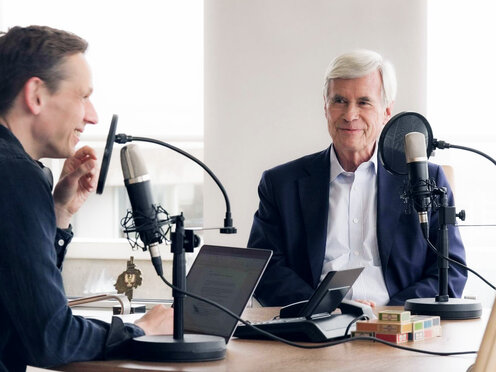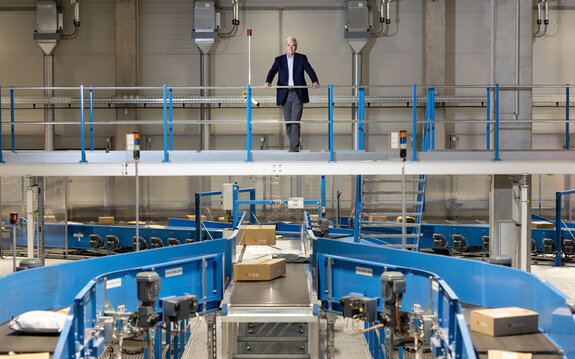Doing Business with Principles
Prof. Dr. Michael Otto unites various principles as an entrepreneur. He realizes that an orientation towards values while simultaneously managing change are not in themselves contradictory. His curiosity and the courage to question the tried and tested are just some of his distinguishing features, alongside his flexibility, agility and innovative spirit, which are consistent with his creative entrepreneurial streak. Foresight, a down-to-earth approach and the conviction that long-term decisions are better for the continued existence of a company – as well as for its employees and for society at large – than short-term success driven by shareholder value form the foundation of his entrepreneurial activities.
Building bridges, leveraging synergies, and daring to try new things – all of this has had a strong influence on the way he conducts business. And he marries this with the firm desire to continuously develop the economy for the benefit of the people, to act sustainably and to contribute to fair social coexistence.
Michael Otto was born into entrepreneurship. His father, Werner Otto, had founded a mail-order business after World War II, which he ran with resourcefulness and a strong will. The business grew rapidly. Werner Otto was aware that an entrepreneur must keep moving to be successful, that he had to find the right answers to current and future customer needs and also think about the well-being of his staff. That is why he was the first to introduce a billing payment system in Germany in 1950 and the five-day work week for all employees in 1956, for example. “My father had many ideas and was a doer, implementer and optimizer,” says Michael Otto.
The principle of optimizing and remaining on top of something – combined with a deep sense of social responsibility – was also Michael Otto’s mindset when he started in 1971 as a member of the Executive Board and worked in the Textile Purchasing department of the company owned by the Otto family. And over the years, he developed and expanded on these principles, adding to his father’s intuitive sense for making the right decisions at the right time with strategic thinking. “Analytical and creative processes belong together,” he says. What this approach means in practice became apparent in various ways, at the latest in 1981, when Michael Otto became CEO of the Otto Group.
Agile Action, Long-term Decision-making
Entrepreneurs must take risks and be able to respond flexibly to constantly new market challenges to find creative, entrepreneurial answers to customers’ needs and the problems of the world. Michael Otto was always aware of this. The risks and ability to act quickly must never jeopardize the company as a whole, however. That is why he diversified the Otto Group by acquiring and founding individual companies, opened new markets and expanded the customer base. He made decisions that were sustainable and would secure the long-term success of the company. The former mail-order catalogue company was transformed into a global digital retail and services group with some 36,000 employees and a large number of key companies, brands and investments in the segments of platforms, brand concepts, retailers, services and financial services.
I have deep respect for Michael Otto's life's work. He is an entrepreneur with vision and courage. Back as early as the 1990s, he recognized the opportunities presented by e-commerce and developed the Otto Group into a global retail and services group.
Susanne Klatten, member of the Supervisory Board of the BMW Group and ALTANA AG
In 2025, Michael Otto handed over the Chair of the Otto Group's Supervisory Board to Alexander Birken. And in March 2026, Michael Otto will hand over the Chair of the Board of Trustees of the Michael Otto Foundation, which holds the majority of the shares in the Otto Group, as well as the Chair of the Board of Partners and the strategic management of the Group to his son Benjamin Otto.
Protecting the Environment, Doing Business Sustainably
This foresight and courage can be seen in many parts of Michael Otto’s career. He was one of the first entrepreneurs to commit to ecologically responsible action. In the 1970s he began with projects such as using recycled cardboard in the mail-order sales sector, and ultimately in 1986 he declared sustainable business and environmental protection to be a corporate goal. This ushered in gradual changes to processes in all areas and a check for potentially environmentally harmful production processes in the range of goods sold. For example: Under what conditions is the cotton used manufactured, spun and later dyed? And what are the options for designing these processes in a more environmentally friendly way? This approach made Michael Otto an exotic figure at the time, ridiculed by fellow entrepreneurs. Today, the Group is far ahead of many others in terms of ecological responsibility. This is also because Michael Otto never forgot to keep an eye on the company’s economic interests, alongside environmental protection. The balance between ecological and economic responsibility must be preserved. After all, an insolvent company helps neither the environment nor people nor society. The Otto Group has been able to achieve important ecological milestones with this approach.
It uses almost exclusively – some 98 percent –sustainably grown cotton for its textile product line of own and licensed brands. The Otto Group has also been pursuing the goal of harmonizing its own business activities with climate protection for decades. The Group more than halved the carbon footprint of its own business activities between 2006 and 2020. An ambitious near-term Science-Based Target (SBT) was developed as an important step towards this goal, addressing the entire value chain. In the long term, the company aims to go beyond the near-term SBT and achieve net-zero emissions across the entire value chain by 2045.
For many years Michael Otto has also focused on safe and fair working conditions along the whole supply chain as well as for his own employees For him, compliance with social standards and environmental protection and occupational safety regulations are crucial. The Otto Group has been offering further training measures and workshops in its supply chains for decades, promoting topics such as fair wages, occupational safety and child-free production among suppliers.
“To transform an economy along ecological lines, companies need charismatic and credible leaders who take the matter seriously. Michael Otto is a good example of this,” says Dr. Maja Göpel, German political economist, transformation researcher and sustainability expert.
Remaining Innovative, Daring to Experiment
Innovation is another area in which Michael Otto has repeatedly demonstrated his foresight in the course of business operations.
“Dr. Otto has always been at the cutting edge, he knows almost everything about technological changes,” says Alexander Birken, long-time CEO and current Chairman of the Supervisory Board of the Otto Group
In the 1980s, Michael Otto started traveling with colleagues from the Otto Group to the United States – to Silicon Valley and the east coast. He visited startups and innovative digital companies to get a feel for the latest trends in IT. That is also why the Otto Group already had online shopping in the mid-1990s. At a time when only a quarter of a million Germans had an internet connection. His innovative spirit and willingness to think outside the box, his ability to recognize trends and to think in the long-term, all these factors contributed to him repeatedly supporting entrepreneurial experiments that offered opportunities, but also ran the risk of failure. Michael Otto repeatedly created or supported development advances to create the structures that have exploited the changes wrought by digitization in recent decades. The company is still benefiting today from his curiosity about technical progress and his desire to be in tune with the times.
Improving the Economy, Shaping Society
Michael Otto has also contributed his knowledge, experience and sense of responsibility for the environment and social issues to bear outside the company. He is the co-founder and initiator of numerous seminal initiatives in the German business community. These include the amfori Business Social Compliance Initiative (amfori BSCI), which has supported a code of conduct since 2001 to improve social standards along various supply chains. Michael Otto’s efforts were instrumental in establishing the foundation “KlimaWirtschaft” ("Climate Economy"), an alliance of German companies dedicated to achieving a climate-neutral economy. Or the “Hamburg Hauptschule Model” that he partnered with Hapag Lloyd to establish, helping graduates of the lowest level of secondary school (Hauptschule) to enter the world of work. This engagement reveals another principle that Michael Otto has repeatedly emphasized throughout his career: The economy is there to benefit people, not the other way around. Challenging and supporting people are not mutually exclusive. Michael Otto values personal responsibility and initiative.
The Otto Group has succeeded in securing a cultural position in our social market economy. And it has done so through sustainability issues and the person of Michael Otto, who embodies what it means to be an honorable merchant focused on the common good. And the fact that this company has managed to successfully grasp the digital transformation is remarkable.
Prof. Dr. Harald Welzer, co-founder and director of FUTURZWEI. Sustainability Foundation
In 2006, Michael Otto was awarded the Federal Cross of Merit with Star for his commitment to the environment and society.
Media
You will find the CV, interviews and other media here.




